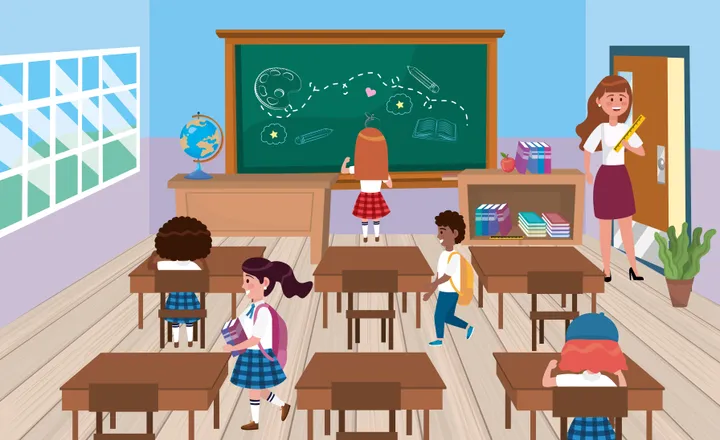
Children's education comes from ... life
I have hesitated so much about giving my opinion on the events surrounding the sexual education guidelines of the Ministry of Education. But one of the reasons why it is so hard for me to give my opinion is that despite being a woman in her 30s (yeah baby #lostreintarockean), talking about sex makes me uncomfortable in a way that cannot be healthy… and well, that has to change so here it goes.
Those who say “I educate my children myself!” are absolutely right, and that should take the weight off their shoulders of worrying about what they are or are not being taught in school. If they are concerned about what their children are learning, the way to ensure they learn “what they should” is (drum roll) to talk to them.1.
If you are particularly worried about what your child knows about sex, ask them a simple question: What do you know about sex? What do you know about human sexuality? Do you know where babies come from? Can you describe the function of the parts of your body? [insert here the version of the question that works for your descendants at their age]
If your child knows less than you would like, tell them exactly what you would like them to know, basic things like: what are inappropriate behaviors, not accepting gifts from strangers, knowing that they can always talk to you about the subject, I imagine these are things they should know as soon as possible.
If they know what you expected, advise them within the common framework they have, again, it never hurts to reinforce the idea that their home is a safe place and that they can always talk to you.
If your child knows more than you would like, open up a dialogue and a healthy debate with your child, advise them at the level your child is at, clarify their doubts, listen to them, without judging. If they have misconceptions or have a different position than yours, it is an opportunity to teach them the scientific articles that support your knowledge.
Explain where your beliefs come from, why you would like them to share them. Teach them risks, facts, examples, statistics. Always at the level of understanding your child has and as I mentioned before, in a healthy debate, with ears open to your descendants’ personal experiences and without judging. And repeat as often as necessary.
And of course, these talks don’t have to be about sex (it’s just the hot topic of the moment), such an exercise teaches much more than knowledge about sex and can be used in many more contexts. You are cementing the bonds you have with your child, teaching them they can trust you.
Such an exercise will teach your child how to present their views: with research, reading, data, and statistics. It will teach them not to be afraid to speak up, to share their lives, their feelings, to have “uncomfortable conversations,” to have meaningful conversations.
Moreover, the exercise is very versatile. You could also openly discuss your concerns with other parents and your descendants’ teachers. With open ears and an open mind.
Because I would also like to believe that my children only learn what their teachers tell them in school and what I teach them. (I’d like them to learn to question too, but that’s another story.) The truth is that knowledge and ideas that I do not share will reach their ears. And especially when it comes to sex. I don’t know what one grows up more bombarded with. And well, I don’t think we can change that yet.
You can easily end up with half very dangerous information: some scene from a movie or something on TV, a half-heard news item, the neighbor/schoolmate “know-it-all” who tells tall tales to impress everyone… and I didn’t grow up with love in the time of Facebook. (Or porn a click away.)
A few days ago I read a comment referring to what the guides say about oral sex. And it said something like “how horrible we stole our children’s innocence” and yes, I don’t want to steal anyone’s innocence, but I definitely prefer to be the one to do it; who can tell them stories about how I lost mine 2.
It wasn’t at school or with my classmates. I remember there was a guy who used to call my house and ask for my dad or my mom (by name) when he realized it wasn’t them on the phone (and in the seconds it took me to recover from the shock and hang up) he went on to describe what he wanted to do to me… which to put it as delicately as possible was much more graphic than anything the guides say.
So there’s my humble suggestion 3, talk to your children, teach them your beliefs in a way that makes them feel safe, in a way that you clarify their doubts, that they learn to identify false news, verify sources, in a way that they don’t have to search if coconut water is abortive or if a pimple in their private parts is an STD, I don’t know what young people Google now.
Footnotes
-
Yes, I don’t have children and that’s one reason why it’s hard for me to have an opinion. But I’m a daughter. And I remember some of the things that happened around the issue. Besides, I’ve interacted with children and teenagers very closely. ↩
-
Yes, in the end, my opinion is backed up by a personal experience and it may have been different for many other people. But if talking saves someone from going through the same and worse, it’s worth talking. ↩
-
It’s an opinion, and well, I know it may sound simplistic, but it’s actually a complicated exercise, yet I think it’s worth it. ↩